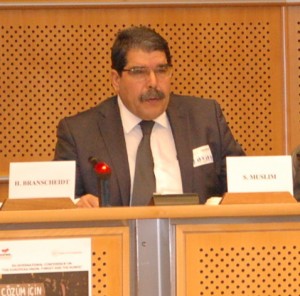By occupostal for Occupy World Writes
The Trans Pacific Partnership has been called “NAFTA on steroids” and a threat to national sovereignty re U.S. trade relationships with countries in the Asian Pacific region. Not just our sovereignty is at stake, but that of all participating nations, since the TPP’s design grants, in effect, legal dominion to transnational corporations wherever law relates to economic growth and development interests, regardless of whichever member nation they conveniently call home base. National and local law and regulation inimical to the provisions of this economic treaty may be subject to coercion, via punitive monetary judgments against their nations when corporations based elsewhere stand to lose profits. This could incentivize change to or nullification of such laws–consumer, labor, environmental protections, you name it–as well as create other negative impacts on their peoples. In a world now ruled by thinking conditioned by capital, hardly anything but “the pursuit of happiness” can avoid being monetized—so the TPP’s regime casts a wide net by design, and could cast a wider and deeper shadow on the lives of every participating country’s citizens.
Although still not finalized, the U.S. means to “fast track” this treaty through its Congress so that acceptance is yea or nay, with little reflection and no amendment possible. Given the massive influence of money on politicians, fast track authority introduces a disaster in the making. At this very moment fast track legislation’s prospects have been dealt a setback blow … but it’s far from a dead prospect.
In this country, only the President, his U.S. Trade Representative, and invited corporate stakeholders have been players in the treaty negotiations. Widespread alarm over the TPP’s negative effects extends to dismay over the near inability to de-fang it if it passes into law. Under our Constitution’s supremacy clause (Article 6, clause 2), treaties are co-equal “law of the land,” even though they are not laws in the usual sense of those passed by Congress and which must conform to the Constitution in all respects. The status of a treaty leaves open the possibility that it could prove—by intention or by unintended effects—to subvert Constitutional rights and roles for governing entities. What happens then has never been legally judged in a definitive way that would apply to a treaty case so comprehensive in impact as to raise the thought of compromised sovereignty. And that’s what we have in the TPP.
Our Constitution gives our executive branch President the power to negotiate treaties for the country. Fast track would reduce the legislative branch Congress’s review and approval of any treaty to a nominal role–rather than the more substantive one suggested by “He shall have Power, by and with the Advice and Consent of the Senate, to make Treaties” (Article 2, Section 2); let alone—since this is an international trade agreement in the form of a treaty–the specific power of the whole Congress to “regulate Commerce with foreign Nations” (Article 1, Section 8).
Given this perspective, it may seem surprising that in the historical creation and implementation of fast track authority legislation, it has never apparently been challenged as unconstitutional. (At best, elected political leaders have called the process “undemocratic”–just listen to their talking heads at this very moment in time.) Fast track is the most obvious weak link in any legal defense of what our executive and legislative branches have done to short-circuit their responsible job performance on behalf of their own people, and to instead skate by to the tune of undue corporate influence.
As I suggested above, Constitutional conflict as regards the TPP treaty itself is another, unsettled matter. But if one follows the “spirit” of the Constitution—and not just the “letter” of what it says regarding the status of treaties—it’s more than reasonable to conclude bad job performance here again. Among the “supreme law of the land,” certainly the Constitution should be the first among equals… or, to adapt the George Orwell of Animal Farm: All supreme law is equal, but some supreme law is more equal than others.
In Federalist No. 64, John Jay put the dilemma bluntly. In partial answer to the question “…if they make disadvantageous treaties, how are we to get rid of those treaties?,” he answered: “As to corruption, the case is not supposable. He must either have been very unfortunate in his intercourse with the world, or possess a heart very susceptible of such impressions, who can think it probable that the President and two thirds of the Senate will ever be capable of such unworthy conduct. The idea is too gross and too invidious to be entertained. But in such a case, if it should ever happen, the treaty so obtained from us would, like all other fraudulent contracts, be null and void by the law of nations.”
We’ve come a long way since John Jay’s day and what was inconceivably gross and invidious then can now be entertained as our norm. The U.S. Supreme Court has seen to that by sanctioning corporations as persons, and unlimited and unidentified application of money as speech, in Citizens United v Federal Elections Commission (2010). Soon the wealthiest “natural” persons may join corporate ranks courtesy of McCutcheon v. FEC (decision pending).
Jay’s judgment that a fraudulent contract should be legally null and void might be realized through a legal challenge that establishes where and how such super-treaties as the TPP rank with respect to the Constitution.
But an important alternative strategy is to challenge such a treaty locally, by creating “TPP-Free Zones” that would deny its authority, one municipality at a time. This is grassroots or micro-level thinking that can have positive impact should the trend grow successfully. And it becomes a direct embodiment of Jay’s calling out of fraud—by the collective will of the people that the fraud most affects, rather than by the hoped-for largesse of their representatives who either benefit from the fraud or remain too unaffected personally by it to modify or repeal the treaty themselves.

In the final analysis, we need to remain ready to push against the TPP at both the macro- and micro-levels. Because it won’t go away until the nature and purpose of corporations is modified to serve the common human good, not simply profit for the select few. Don’t hold your breath on that goal being entertained, even by our governments, any time soon.
For more background on the TPP, see our previous article, TPP – Why You MUST Care, and links to Expose the TPP and Flush the TPP!. You can also read this analysis of fast track trade authority by Public Citizen.
(Click image to read)
Infographic that describes the digital rights implications of the Trans-Pacific Partnership agreement. CC-BY-3.0 Anonymous assigned to the public domain, via Wikimedia Commons.





![By U.S. Air Force photo illustration by Airman 1st Class Kenna Jackson [Public domain], via Wikimedia Commons](http://occupyworldwrites.org/wp-content/uploads/2014/01/1024px-Woman_crying_in_bathroom-e1389934897799-192x300.jpg)
![Soybeans and corn fields. Photo by Dwight Burdette (Own work) [CC-BY-3.0 (http://creativecommons.org/licenses/by/3.0)], via Wikimedia Commons](http://occupyworldwrites.org/wp-content/uploads/2014/01/512px-Corn_and_Soybeans_Growing_in_a_Field_Morgan_Road_Pittsfield_Township_Michigan-300x199.jpg)
![By GNOME icon artists (GNOME SVN / GNOME FTP) [GPL (http://www.gnu.org/licenses/gpl.html)], via Wikimedia Commons](http://occupyworldwrites.org/wp-content/uploads/2014/01/500px-Gnome-computer_svg-300x300.png)
![Protestors in Kiev in November. Photo by Ivan Bandura (Own work) [CC-BY-3.0 (http://creativecommons.org/licenses/by/3.0)], via Wikimedia Commons](http://occupyworldwrites.org/wp-content/uploads/2014/01/512px-Protesover_EU_deal-200x300.jpg)
![Photo courtesy Al Jazeera: Elections are set for February and political polarisation is intensifying [Reuters]](http://occupyworldwrites.org/wp-content/uploads/2014/01/Bangkok-protestsAlJazeera-300x186.jpg)
![Photo by Ted Van Pelt [CC-BY-2.0 (http://creativecommons.org/licenses/by/2.0)], via Wikimedia Commons](http://occupyworldwrites.org/wp-content/uploads/2014/01/RichardPetty1985Pocono-297x300.jpg)